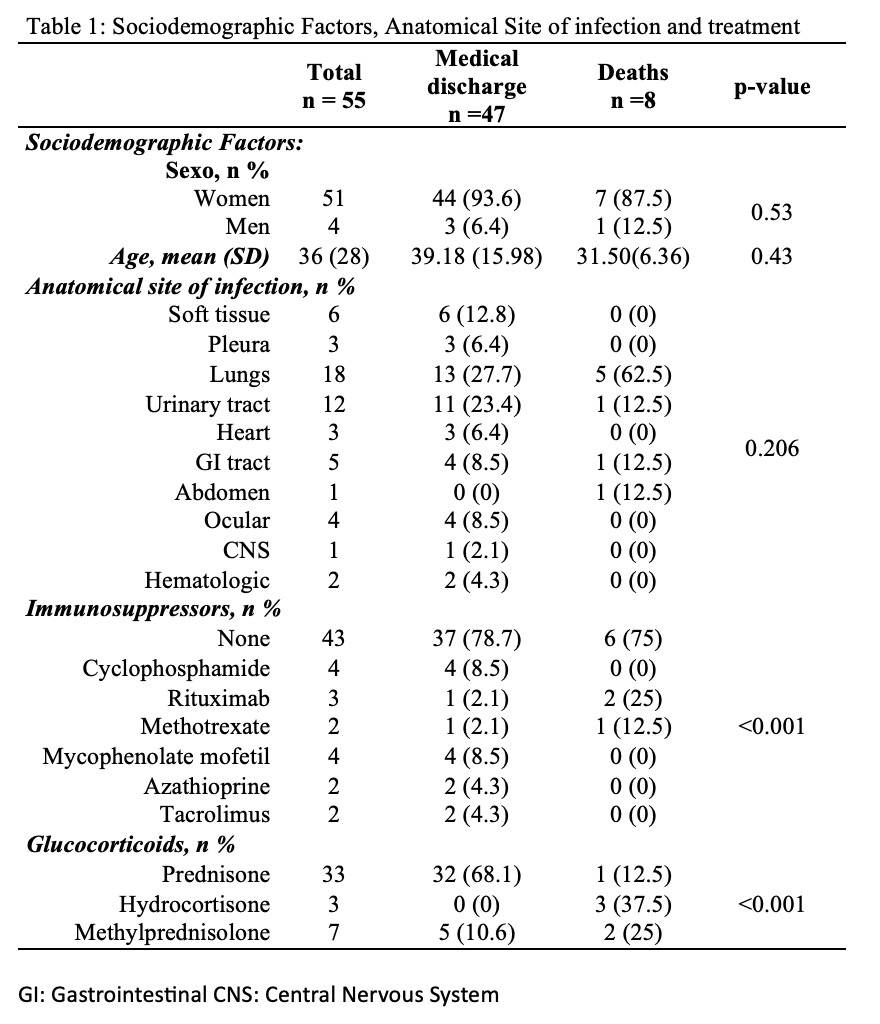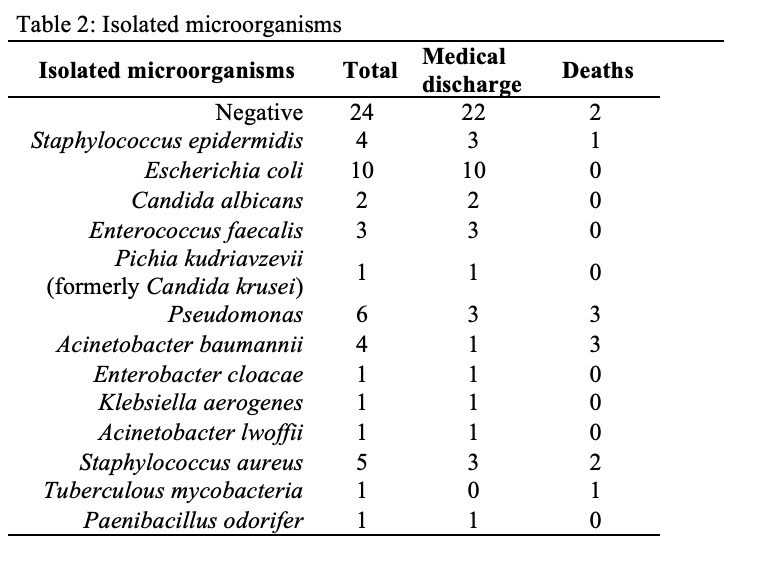Session Information
Session Type: Poster Session A
Session Time: 10:30AM-12:30PM
Background/Purpose: Autoimmune rheumatic diseases (ARD) are chronic conditions that affect multiple organ systems. Patients with ARD tend to have a weak immune system due to disease activity or immunosuppressant treatments. These characteristics predispose to infections, thus a reason for frequent hospitalization. We aim to describe and indicate the clinical implications, bacterial profiles, and patient outcomes in hospitalized patients with ARD.
Methods: We conducted a descriptive, cross-sectional, and comparative study among patients hospitalized for infection with ARD diagnosis and referred to the rheumatology service in a university hospital. We excluded referred patients without infection and ARD diagnosis. Information collected was demographic data, hospitalization history, diagnosis of ARD, type of infection, isolated pathogens and antibiotic susceptibility profiles, and patient outcomes from March 2023 to April 2024. The Shapiro-Wilk test was used for the normality of quantitative variables, the Squared-Chi test to compare categoric variables, and the Mann-Whitney U to compare non-parametric continuous variables. A p-value < 0.05 was considered for statistically significant differences.
Results: A total of 55 hospitalized patients by infection were included, 51 (92.72%) were women and 4 (7.27%) were men. The mean age was 36 (SD 28). Forty-seven (85%) patients had medical discharge and eight (14.54%) died. Site of infections were 18 (32.72%) lung infections, 12 (21.81%) urinary tract infections, and 6 (10.9%) soft tissue infections. Immunosuppressant and glucocorticoid treatment is shown in Table 1. Escherichia coli was isolated in 10 cultures, Pseudomonas pp. in 6, and Staphylococcus aureus in 5. The rest of the isolated microorganisms are shown in Table 2
Conclusion: More than 85% of the patients were discharged and 14% died. There was a significant association between the immunosuppressant and glucocorticoid treatment and the clinical outcome of the patients. The primary site of infection was in the lungs followed by the urinary tract. More than 50% of the deaths were caused by a lung infection, but there was no association between the site of infection and the outcome of the patients. The most frequent microorganism was Escherichia coli and deaths were caused by Acinetobacter baumanii and Pseudomonas spp.
To cite this abstract in AMA style:
Garza-Elizondo A, Bardan-Inchaustegui A, Gamez-Siller P, Flores-Alvarado D, Esquivel-Valerio J, Cardenas-de la Garza J, Davila-Correa E, Osuna-Corrales A, Duran-Villarreal K, Salcedo-Soto D, Gauna-Leal D, Prado-Prado A, Morales-Espronceda D, Valdez-Benavides N, González-Ontiveros N, Galarza-Delgado D. Clinical Implications, Bacterial Profiles, and Patient Outcomes in Hospitalized Patients with Autoimmune Rheumatic Diseases [abstract]. Arthritis Rheumatol. 2024; 76 (suppl 9). https://acrabstracts.org/abstract/clinical-implications-bacterial-profiles-and-patient-outcomes-in-hospitalized-patients-with-autoimmune-rheumatic-diseases/. Accessed .« Back to ACR Convergence 2024
ACR Meeting Abstracts - https://acrabstracts.org/abstract/clinical-implications-bacterial-profiles-and-patient-outcomes-in-hospitalized-patients-with-autoimmune-rheumatic-diseases/


